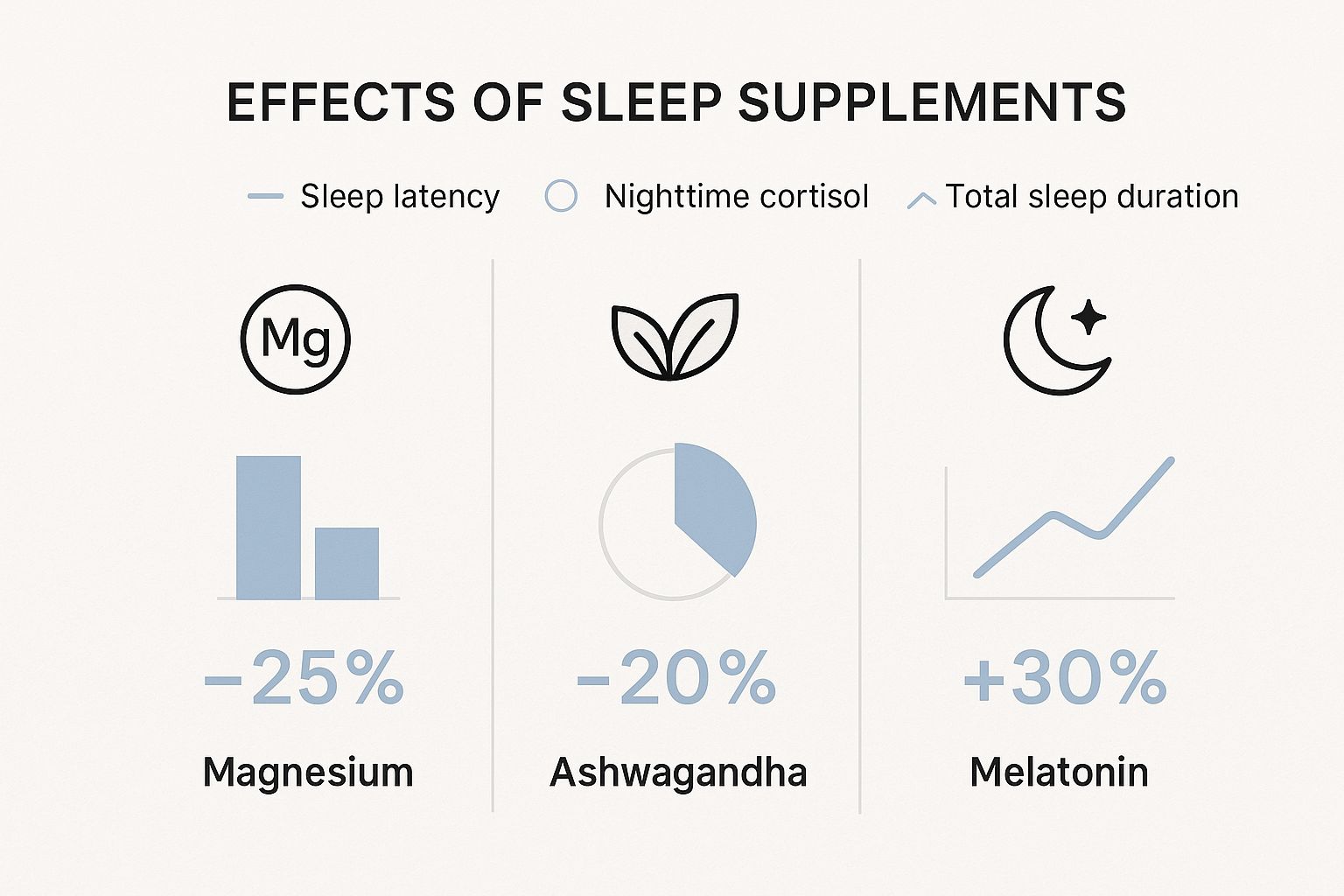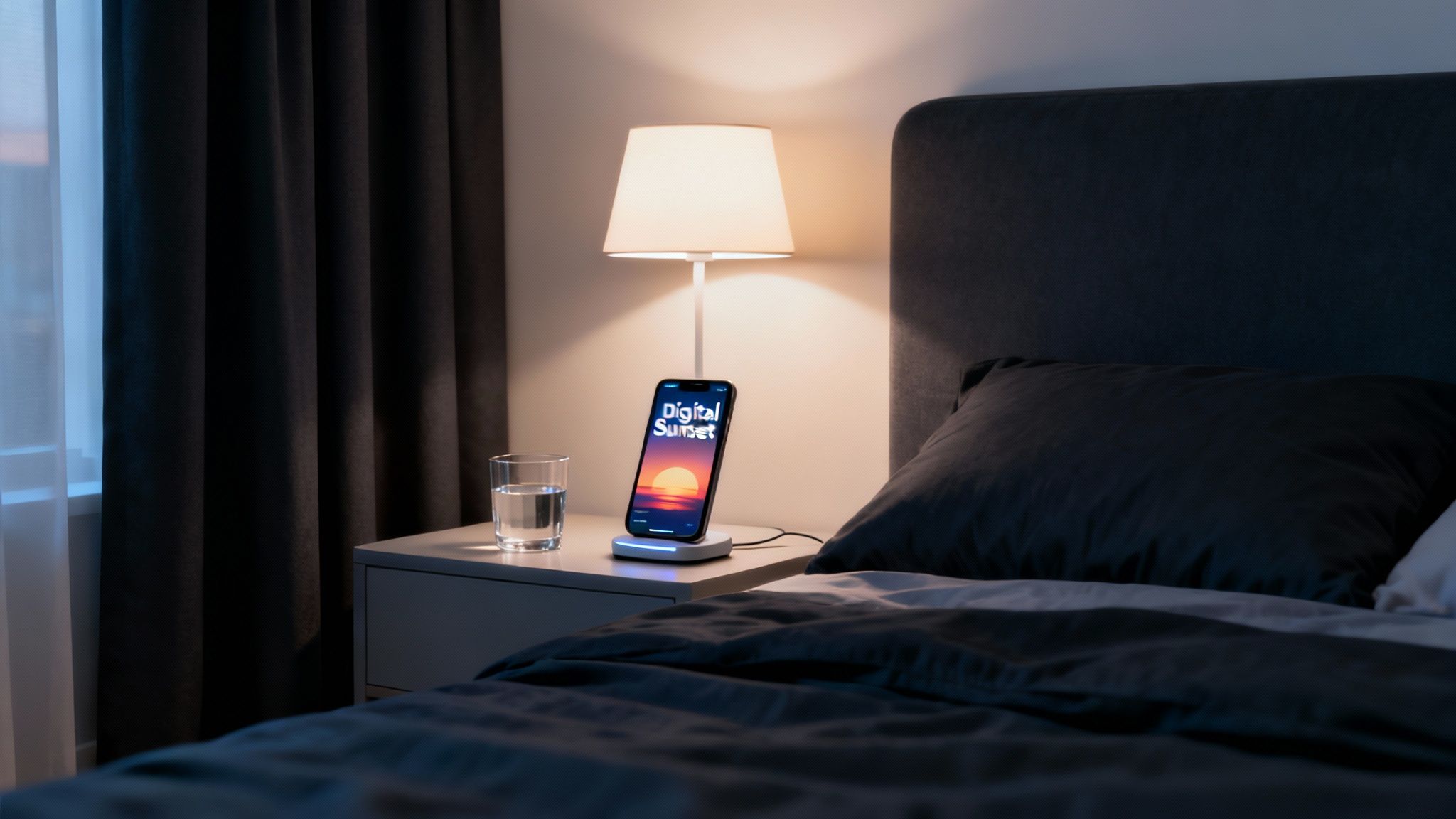
Your Guide to Supplements for Better Sleep
Share
Struggling to get a good night's sleep? You're not alone. The answer might lie in a few targeted supplements, like magnesium to help your nervous system unwind, ashwagandha to take the edge off stress, and omega-3s to support your brain's nightly reset. The key is figuring out why you’re not sleeping – is it stress, a restless body, or waking up every few hours?
Finding the Right Supplement for Your Sleep

If you're fed up with tossing and turning, you've come to the right place. We’re going to get straight to it and look at natural, effective ways to improve your rest.
Think of sleep supplements not as a magic bullet, but as a skilled support crew for your body's nightly repair work. Each one has a specific job, helping you get that deeper, more consistent sleep you've been missing.
Why People Choose Natural Sleep Aids
This move towards natural sleep aids isn’t just a passing trend. The UK sleep aids market is seeing solid growth as more of us look for non-habit-forming options. There's a clear shift away from pharmaceuticals towards herbal supplements and relaxation aids, driven by a growing awareness of potential side effects and dependency.
If you're interested in the numbers, you can find more insights into the European sleep aid market on CognitiveMarketResearch.com.
This change shows we're looking for solutions that work with our bodies, not against them. Instead of being forced into sleep, the goal here is to gently support the body's own natural processes.
The objective isn't just to fall asleep faster, but to improve the overall quality of your rest. This means achieving deeper sleep cycles, waking up less frequently during the night, and feeling genuinely refreshed and clear-headed the next morning.
The right supplement can help you tackle the specific things standing between you and a great night's sleep.
- Difficulty falling asleep: A racing mind or restless legs can make it impossible to switch off.
- Waking up during the night: Poor sleep quality leads to constant interruptions, wrecking your sleep cycle.
- Waking up tired: Even after eight hours, you might not feel rested if your sleep wasn't deep enough.
We'll break down how different supplements address these common problems, helping you make a smart choice for your own sleep struggles.
A Quick Look at Top Sleep Supplements
Before we dive deep into the science behind each option, here's a quick summary to help you get your bearings. Think of this as a cheat sheet for understanding the main players in the world of natural sleep support.
| Supplement | Primary Role in Sleep | Best For... |
|---|---|---|
| Magnesium | Calms the nervous system and relaxes muscles. | People who feel physically tense or restless at night. |
| Ashwagandha | Lowers cortisol (the stress hormone). | Those with busy, racing minds or who feel "wired but tired." |
| L-Theanine | Promotes relaxation without causing drowsiness. | Anyone needing to unwind and quiet their mind before bed. |
| Omega-3s | Supports brain health and hormone regulation. | Improving overall sleep quality and waking up refreshed. |
| Apigenin | Binds to brain receptors to reduce anxiety. | People who struggle with anxiety-related sleeplessness. |
This table gives you a snapshot, but the real magic is in understanding how these supplements work and how they might fit together. Let's get into the specifics.
How Supplements Support Your Natural Sleep Cycle
To really get how supplements for better sleep work, we first need a quick look at your body's internal clock, known as the circadian rhythm. Picture this rhythm as a finely tuned orchestra, with key hormones like melatonin and cortisol acting as the conductors.
When this orchestra is in sync, you fall asleep easily and wake up feeling refreshed. But modern life—with its constant stress, late-night screen time, and less-than-ideal diets—can throw this delicate performance into chaos. This is exactly where targeted supplements can step in.
Retuning Your Body's Orchestra
Think of supplements as tuning forks for your body, helping to restore harmony to your natural sleep processes. They don’t force your body into an unnatural state; instead, they provide the specific nutrients and compounds it needs to support the systems already in place.
For instance, some supplements work by calming the central nervous system, effectively quieting the 'noisy' instruments in the orchestra that keep you buzzing at night. Others focus on managing the 'stress' conductor (cortisol), preventing it from drowning out the 'rest' conductor (melatonin) when it's time to wind down.
This way of thinking helps you see supplements not just as simple sleep aids, but as tools to support your body’s complex and natural cycles.
By getting to the root causes of sleep disruption, like hormonal imbalances or nutrient gaps, a good multivitamin can ensure your body has all the micronutrients it needs, while other supplements can help re-establish a healthy sleep-wake pattern. The result? More restorative and consistent rest.
Understanding this relationship is the key to picking the right supplements for better sleep that will actually work for you.
The Role of Hormones and Neurotransmitters
At its core, your sleep is governed by a delicate dance between hormones and neurotransmitters. When just one of these is out of balance, the whole system can feel the effects.
- Melatonin: Often called the "hormone of darkness," melatonin is the signal to your body that it's time to sleep. Its production naturally ramps up in the evening as the light fades.
- Cortisol: Known as the "stress hormone," cortisol follows the opposite pattern. It should be highest in the morning to get you up and going, and at its lowest at night.
- GABA (Gamma-Aminobutyric Acid): This is your brain's main calming neurotransmitter. It helps to quiet down an overactive mind, reduce anxiety, and prep you for sleep.
A lot of sleep issues come down to disruptions in these key players. Chronic stress can keep cortisol levels high at night, while staring at screens can suppress melatonin production. This is where a well-chosen supplement can make a real difference. For example, magnesium plays a crucial role in regulating neurotransmitters that promote calm, including GABA. To dive deeper into this powerful mineral, you can learn more about the benefits of zinc and magnesium supplements in our detailed guide.
This infographic shows the specific impact key supplements can have on measurable sleep metrics.

As you can see, each supplement targets a different part of the sleep cycle, from cutting down the time it takes to fall asleep to extending your total rest time. This data really highlights how a targeted approach can effectively tackle specific sleep challenges by supporting your body’s natural mechanisms. Once you understand these interactions, you can start building a smarter, more effective strategy for getting better nights.
Exploring the Most Effective Sleep Supplements

Now that you’ve got a handle on how supplements can work with your body's natural sleep rhythm, let's get into the specifics. We're going to focus on a group of well-researched, genuinely effective supplements that tackle the most common sleep problems head-on.
This isn't about chasing a single magic pill. It's about understanding what each of these key players does, so you can build a smart strategy that actually works for you. From calming a racing mind to easing physical tension, each one has a unique role to play in helping you finally get that deep, restorative rest you've been missing.
Magnesium: The Relaxation Mineral
Think of magnesium as your body’s ultimate relaxation mineral. Its main job is to help calm your central nervous system, acting like a dimmer switch on a brain that just won't power down. When you're low on magnesium, your nerve cells can become way too excitable, leading to that classic 'wired but tired' feeling where you simply can't switch off.
Magnesium helps regulate neurotransmitters that promote calm, especially GABA, which is brilliant at quieting down nerve activity. It also plays a massive part in relaxing muscle fibres—a total game-changer if you struggle with physical restlessness or tension at night.
But here’s the thing: not all magnesium is created equal when it comes to sleep.
- Magnesium Glycinate: This is the one I recommend most often for sleep. It’s bound to the amino acid glycine, which also has its own calming effect on the brain. This form is super absorbable and, importantly, gentle on your stomach.
- Magnesium L-Threonate: This form is a bit special because it's known for its ability to cross the blood-brain barrier. This makes it excellent for supporting cognitive function and dialling down mental chatter before bed.
A great starting dose for sleep support is between 200-400 mg, taken about an hour before you plan to go to bed. It's perfect for anyone who feels physically tense, has restless legs, or just can't seem to quiet their thoughts at night.
Ashwagandha: The Stress Adaptogen
If stress is the main villain in your sleep story, ashwagandha is the hero you need. As an adaptogen, it essentially helps your body become more resilient to both physical and mental stress. Its real superpower is its ability to help lower cortisol levels, especially when they’re stubbornly high at night.
Your main stress hormone, cortisol, should naturally be low in the evening to let melatonin rise and do its thing. Chronic stress can completely flip this pattern, leaving you feeling alert and anxious just when you should be winding down. Ashwagandha steps in to help rebalance this rhythm.
By regulating the body's stress-response system, ashwagandha doesn't just knock you out; it creates the calm internal environment needed for sleep to happen naturally. This makes it one of the best supplements for better sleep when anxiety is a key factor.
For sleep benefits, a dose of 300-600 mg of a standardised root extract in the evening is what’s commonly used. This supplement is ideal for the "wired and tired" professional, anyone with a high-stress job, or those whose minds start racing with worries the moment their head hits the pillow.
Omega-3s: The Brain Health Boosters
While not a direct sedative, omega-3 fatty acids are absolutely fundamental for brain health, which is directly tied to your sleep quality. These essential fats, particularly DHA, are a major structural component of your brain and play a vital role in regulating neurotransmitters like serotonin and dopamine.
Why does that matter for sleep? Well, serotonin is a precursor to melatonin, the sleep hormone. Healthy levels of omega-3s help ensure this conversion process runs smoothly. Some research even suggests that having enough DHA is linked to longer, more restorative sleep with fewer night-time awakenings.
You can get omega-3s from fatty fish, of course, but a high-quality fish oil or algae-based supplement can ensure you get a consistent, effective dose. Look for one that provides at least 1,000 mg of combined EPA and DHA. This is more of a foundational supplement, best for anyone looking to improve long-term sleep quality and wake up feeling mentally sharper.
Functional Mushrooms: The Deep Sleep Enhancers
Functional mushrooms, especially Reishi, have been used for centuries in traditional medicine to promote calmness and support sleep. Reishi is often called the "mushroom of immortality," but for our purposes, it’s better to think of it as the "mushroom of tranquillity."
Reishi is also an adaptogen, helping the body handle stress. Its unique compounds, called triterpenes, have a particularly calming effect on the nervous system. This can help you fall asleep faster and, more importantly, stay asleep longer. People who use it often report achieving deeper, more restorative sleep phases. Among the widely recognized options, you might be interested in learning more about buying melatonin as another potential aid for regulating sleep cycles.
Mushroom blends often combine Reishi with other beneficial mushrooms like Lion's Mane, which supports cognitive health. When picking a mushroom supplement, look for one made from the "fruiting body" of the mushroom—this part contains the highest concentration of active compounds. A typical dosage can vary, but 500-1,500 mg per day is a common range.
This type of supplement is perfect for light sleepers, those who wake up frequently throughout the night, or anyone wanting to seriously enhance the restorative quality of their sleep. And for those looking for an all-in-one solution, our expertly formulated Sleep Formula combines several of these key ingredients to provide comprehensive support.
To help you see how these supplements stack up against each other, here's a quick comparison table. It breaks down what each one does, the best form to look for, and who might benefit the most.
Comparing the Core Four Sleep Supplements
| Supplement | Mechanism of Action | Recommended Form | Ideal For... |
|---|---|---|---|
| Magnesium | Calms the central nervous system, relaxes muscles, and regulates neurotransmitters like GABA. | Magnesium Glycinate or L-Threonate. | Individuals with physical tension, restless legs, or a 'wired but tired' feeling. |
| Ashwagandha | An adaptogen that lowers elevated cortisol levels, helping the body manage stress and promoting a calm state for sleep. | Standardised Root Extract (e.g., KSM-66). | People with high stress, anxiety, or racing thoughts that interfere with sleep. |
| Omega-3s | Supports brain health and the production of serotonin, a precursor to the sleep hormone melatonin. | High-quality fish or algae oil with at least 1,000 mg of EPA/DHA. | Anyone looking to improve long-term sleep quality and overall brain function. |
| Functional Mushrooms (Reishi) | Calms the nervous system through triterpenes and helps the body adapt to stress, promoting deeper, more restorative sleep. | Extract from the "fruiting body." | Light sleepers, those who wake frequently, or anyone wanting to enhance sleep depth. |
Ultimately, choosing the right supplement—or combination of supplements—is about understanding your own unique sleep challenges. Use this guide to pinpoint what might be holding you back from a great night's rest and build a personalised stack that helps you achieve it.
Creating Your Personal Sleep Supplement Routine
Getting to grips with individual supplements is the first step, but the real magic happens when you start building a smart, synergistic routine. This is where we go from single ingredients to creating a personalised supplement 'stack'—a combination designed to hit your specific sleep problems right where they hurt. A one-size-fits-all approach just doesn't cut it, because everyone's sleep challenges are unique.
The idea is to pair supplements so their benefits work together, not against each other. For instance, one supplement might help quieten a racing mind, while another works to ease physical tension in your body. By combining them, you're tackling multiple issues at once, which often leads to a much better night's rest.
To see how this works in the real world, let's break down a few common scenarios. Think of these as profiles to help you pinpoint your own sleep patterns and understand the thinking behind building a custom stack.
For The Wired and Tired Professional
You know the feeling: mentally drained but physically buzzing. Days are spent in high-stress meetings, staring at screens, and fuelled by one too many coffees. When you finally hit the pillow, your brain refuses to switch off, endlessly replaying the day's events or worrying about tomorrow's to-do list.
The main issue here is an overactive nervous system and sky-high evening cortisol levels. The goal is to gently dial down that mental chatter and give your body the signal that it's finally safe to unwind.
The Ideal Stack:
- Ashwagandha: Taken in the early evening, this adaptogen gets to work on lowering cortisol, the stress hormone that's keeping you alert and on edge. Think of it as slowly turning down the volume on your body's internal alarm system.
- Magnesium Glycinate: About an hour before bed, this form of magnesium offers direct support to the nervous system. It helps to quieten an overactive brain and eases the physical tension you've been carrying in your shoulders and neck all day.
This duo tackles sleeplessness from two angles: the hormonal (cortisol) and the neurological (that racing mind). Ashwagandha sets the stage for calm, and magnesium delivers the final nudge into relaxation. It’s a powerful combination for anyone whose stress follows them to bed.
For The Fitness Enthusiast
This person trains hard and is otherwise healthy, but their intense physical routine can sometimes get in the way of good sleep. Sore muscles, physical restlessness, or just feeling 'amped up' after an evening workout can make it tough to settle down. For them, sleep is all about physical recovery.
Deep sleep is when the body does its best repair work, producing the most growth hormone to mend muscle tissue. If sleep is light or constantly interrupted, recovery suffers, and so does performance.
The Ideal Stack:
- Magnesium Glycinate: This is pretty much a non-negotiable for anyone who trains regularly. It doesn't just calm the nervous system; it plays a vital role in muscle relaxation and function. Taking it after a workout or before bed can make a real difference to muscle soreness and that fidgety feeling.
- Creatine Monohydrate: Famous for its muscle-building benefits, some research also suggests creatine can support sleep, especially when you're sleep-deprived. It seems to help maintain brain function and energy levels even after a rough night.
This pairing is laser-focused on physical restoration. For a fitness enthusiast, figuring out the best time to take magnesium can be a total game-changer for both recovery and sleep quality. It helps the body shift gears into a restful state, allowing all those crucial recovery processes to kick in overnight.
A common mistake is thinking more is always better. Start with a single supplement that targets your biggest issue. Once you've assessed its effects for a week or two, you can consider adding a second, complementary ingredient if needed.
This methodical approach helps you pinpoint what truly works for your body without overcomplicating things.
For The Light Sleeper
The light sleeper can fall asleep just fine, but staying asleep is another story. They might wake up at the slightest noise, find themselves staring at the ceiling at 3 AM, or just feel like they've been hovering on the edge of sleep all night. The problem isn't getting to sleep—it's the quality and depth of that sleep.
This often points to not spending enough time in the deep, restorative stages of the sleep cycle. The goal here is to encourage a more robust and uninterrupted night's rest.
The Ideal Stack:
- Functional Mushroom Blend (with Reishi): Reishi has a reputation for promoting a sense of tranquillity and supporting deeper sleep cycles. It’s not a sedative; instead, it gently calms the nervous system, making you less likely to be jolted awake by small disturbances.
- Omega-3s: These essential fatty acids are foundational for brain health. They play a part in regulating serotonin, a precursor to the sleep hormone melatonin. A consistent intake supports the brain's ability to maintain a healthy sleep structure, leading to more consolidated and higher-quality rest.
This stack is built for long-term improvement. The mushroom blend works nightly to deepen your sleep, while the omega-3s provide the underlying brain support needed for more sustainable, restorative nights. Building your routine around these kinds of targeted pairings is how you create a truly effective strategy with supplements for better sleep.
Lifestyle Habits That Power Your Supplements

While the right supplements are fantastic tools, they can't work miracles on their own. For them to really shine, they need to be paired with solid, healthy habits.
Think of it this way: your supplements are like putting high-performance fuel in a race car. But it’s your lifestyle habits—the essential maintenance and skilled driving—that actually get you across the finish line. To truly amplify your results and get the most from your investment, you need both working together.
After all, a supplement is fighting an uphill battle if it's up against a chaotic evening routine. These simple practices will create the perfect foundation for your supplements to do their best work.
Create a Sleep Sanctuary
Your bedroom should send one clear signal to your brain: it's time for rest. It's not a cinema, a restaurant, or an office extension. Transforming it into a cool, dark, and quiet sanctuary is one of the most powerful things you can do for your sleep.
Aim for a room temperature between 16-19°C. This helps your body’s core temperature to drop, which is a natural trigger for sleepiness. Blackout curtains are a must to block out any intrusive light, and it’s wise to cover or remove any electronics with glowing lights. Even tiny amounts of light can disrupt the production of melatonin, your body's main sleep hormone.
Building a solid foundation with good sleep hygiene is crucial. You can explore more tips for creating a healthy sleep environment to get your space fully optimised.
Implement a Digital Sunset
The blue light blasting from our phones, tablets, and computers is one of the biggest enemies of modern-day sleep. It’s particularly sneaky because this specific wavelength of light is brilliant at suppressing melatonin production, essentially tricking your brain into thinking it’s still daytime.
The solution? A "digital sunset." This just means switching off all screens at least 60-90 minutes before you plan to hit the hay. This buffer gives your brain the time it needs to wind down and start producing melatonin naturally.
Forget scrolling through social media or firing off one last email. Use this time for a proper wind-down routine. Read a physical book, do some gentle stretching, jot down your thoughts in a journal, or listen to some calming music.
This simple habit creates a clear boundary between the buzz of your day and the restorative peace of your night, making it much easier for supplements like magnesium and ashwagandha to work their magic.
Be Mindful of Meal and Exercise Timing
What you do in the final few hours before bed can make or break your night's sleep. Timing your meals and exercise strategically can make a world of difference.
- Avoid large meals close to bed: Eating a heavy meal within three hours of bedtime can lead to indigestion and blood sugar spikes, both of which can disrupt sleep.
- Time your exercise wisely: A tough workout is fantastic for you, but it raises your core body temperature and cortisol levels. It's best to finish any vigorous exercise at least three hours before bed to give your body time to cool down and calm down.
- Limit caffeine and alcohol: Caffeine can linger in your system for hours, disrupting sleep even if you had it in the early afternoon. Some energy powders are designed for pre-workout focus, but check the ingredients to ensure they won't interfere with your rest later on. And while alcohol might make you feel drowsy at first, it often causes fragmented, poor-quality sleep later in the night.
It’s clear that more and more people are taking a proactive approach to their health through both lifestyle and supplements. The UK dietary supplements market was valued at around $4.79 billion in 2024 and is projected to hit $9.65 billion by 2033. This shows a huge collective shift towards taking wellness into our own hands.
Your Next Steps Toward Better Sleep
The journey to better sleep is a marathon, not a sprint, but hopefully, this guide has given you a solid map to get started. Just remember, supplements work best when they’re part of a bigger picture—think of them as powerful allies supporting your healthy lifestyle choices.
We’ve looked at how Magnesium can help you unwind, how Ashwagandha tackles stress, and how other key players get your natural sleep cycle back on track. Your first move now? Pinpoint your biggest sleep challenge. Is it a racing mind keeping you awake, physical restlessness, or waking up in the middle of the night?
Once you’ve got a clearer idea of the problem, you can start with one or two targeted supplements for better sleep that go right to the source. The goal is to feel confident and in control as you take back your nights and invest in the deep, restorative rest you deserve.
This article is for informational purposes only and is not medical advice. Always consult a qualified health professional before starting any new supplement or major lifestyle change.
